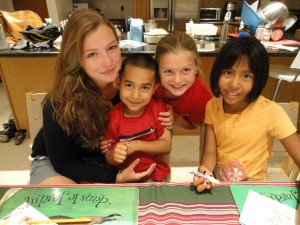 Recently, I was telling another mom at Mateo’s preschool about some of the valuable lessons we learned at Heritage Camp, especially about incorporating elements of our children’s Guatemalan culture into our daily lives. One of the most important ways my husband and I can do this is by helping our children to learn Spanish and to learn Spanish ourselves. When I fostered Olivia in Antigua in 2003, I studied Spanish. This fall I’ve enrolled in a class to refresh what I learned. Olivia herself will begin Spanish in the upcoming school year. We’re lucky because in our California district, children take Spanish from Grade 3.
Recently, I was telling another mom at Mateo’s preschool about some of the valuable lessons we learned at Heritage Camp, especially about incorporating elements of our children’s Guatemalan culture into our daily lives. One of the most important ways my husband and I can do this is by helping our children to learn Spanish and to learn Spanish ourselves. When I fostered Olivia in Antigua in 2003, I studied Spanish. This fall I’ve enrolled in a class to refresh what I learned. Olivia herself will begin Spanish in the upcoming school year. We’re lucky because in our California district, children take Spanish from Grade 3.
The mom at Mateo’s preschool, “Ms. G,” agreed that speaking the language is an important way to stay connected to a culture, but, she quickly added, speaking the language doesn’t mean you necessarily “belong” to the culture. She used her own life story to illustrate.
Ms. G is from Korea. When she was a girl—she is now in her mid-thirties—her father relocated her mother, her brother, and her to this country in search of better opportunity. The family settled in the Northeast. Ms. G spoke Korean in her home and English everywhere else. Around the time Ms. G became a teenager, she longed to return to Korea. After she graduated from college, she did. She stayed for a year before returning to the U.S.
Ms. G said, “I speak Korean and still have family there. Nevertheless, what I learned in Korea is that I’m an American.” Ms. G is now married with two children, and settled in Northern California. Because the area is home to thousands of Asians and Asian-Americans, she feels more comfortable in California than she did in her small Northeastern town.
My conversation with Ms. G made me realize that issues around identity and belonging are not unique to children who are adopted. The issues certainly are magnified and more complicated for our kids. But many people originally from other cultures also struggle to discover where they fit in.
My challenge as an adoptive mother is to help my children become secure and confident enough to know who they are, wherever they are in the world. Learning Spanish remains a vital part of that equation. However, as Ms. G showed me, it’s not the only part.
Tags: adoption from Guatemala, Antigua Guatemala, Colorado Heritage Camp, cross-cultural adoption, identity issues, studying Spanish, transracial adoption



 ShareThis
ShareThis